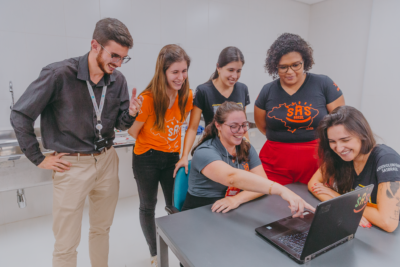· The launch of this innovation laboratory for education in Brazil marks a significant leap in the advancement of health training for remote regions of Brazil
· Leveraging Philips' expertise in ultrasound services and training thousands of healthcare professionals allows us to further expand much-needed specialized healthcare
· The foundation also supported SAS Brasil in serving communities affected by the floods in Rio Grande do Sul
The Philips Foundation, with the mission of providing access to quality healthcare for 100 million people per year in underserved communities by 2030, and SAS Brasil, announce the launch of an innovation laboratory dedicated to digital health education. This initiative focuses on health gaps in remote Brazilian communities by providing quality training, leveraging ultrasound technology, and serving as a study field to research the impact of new health technologies and advocate for policy changes to improve primary care.
O SAS Brasil Living Lab, a collaborative initiative with UNICAMP – one of the most prestigious universities in Brazil – was created with the support of the Philips Foundation. This innovation lab will serve as a hub for digital health research, innovation and education, benefiting healthcare professionals and students by enhancing their skills and knowledge in digital health practices. The initiative is based on a previous project between SAS Brasil, Philips Brasil and the Philips Foundation, during which the country's first remote ultrasound was performed. In this project, telehealth protocols were developed, which now serve as the basis for new training programs in the innovation laboratory.
By leveraging Philips' expertise in ultrasound, the Philips Foundation plays a leading role in enabling access to vital healthcare services, including offering maternal care via telesound to remote communities. In addition, the support will make it possible to monitor patients' vital signs remotely, perform electrocardiograms (ECGs) and perform remote cervical exams. The initiative aims to train 3,600 people, enabling access to quality healthcare for a coverage area of 3.6 million people in Brazil.
Expansion of specialized service capacity
Brazil's vast size poses challenges to its healthcare system, particularly in providing specialized care to remote regions. Long distances to advanced healthcare facilities and a shortage of specialized healthcare professionals make access to quality care in these areas difficult.
For more than 100 years, we have been innovating in healthcare because it is a major social challenge, where innovation can achieve change and have a substantial impact. When we talk about health technology, we tend to think about highly complex equipment, which may be a reality in the state of São Paulo, but not throughout Brazil. We believe that innovation initiatives need to consider different audiences and seek solutions to provide access for all. Only in this way will we make a difference as an industry in the country”, points out Patricia Frossard, country manager at Philips in Brazil.

Students active in the Living Lab | Credit: SAS website
The WHO predicts a global shortage of 10 million health professionals by 2030, mainly affecting low- and middle-income countries [1]. To address this challenge, task shifting has emerged as a crucial strategy to strengthen and expand the healthcare workforce. Coupled with the increasing incidence of non-communicable diseases [2] and continued obstacles to accessing maternity care across Latin America [3], particularly in remote regions, the ability for early diagnosis is a necessity.
“By providing our first students with innovative tools and training, we are unlocking their potential to become skilled healthcare professionals capable of providing specialized care to those most in need,” he says. Sabine Zink, CEO of SAS Brasil. “Additionally, SAS Brasil's Living Lab can serve as an 'incubator' to test new technologies and put research into practice, potentially advocating policy changes to benefit primary health care. This allows us to address health gaps in remote communities, ensuring high-quality services are accessible regardless of geography.”
Building a successful partnership
In an initial collaboration, the Philips Foundation, Philips Brasil and SAS Brasil came together in establishing four specialized telehealth centers to provide quality healthcare to remote areas. These centers, initially intended to carry out 19 thousand consultations, exceeded expectations by offering 29 thousand exams and consultations, both online and in person.
Today, three of the centers are entirely staffed by public health nurses, highlighting the initiative's sustainable approach, which prioritizes local capacity building and ensures continued access to specialist healthcare services in these remote regions.
“By empowering local health professionals and providing specialized health services, they have provided much-needed care to some of the most remote communities in Brazil,” explains Margot Cooijmans, director of the Philips Foundation. “The success of this approach has paved the way for further expansion in 2024, with an innovation lab where students are trained to operate life-saving technology, thus extending access to diagnostic capabilities to even the most remote corners of the country.”
Supporting communities impacted by severe flooding in Rio Grande do Sul
Aware of the impact of severe flooding in Rio Grande do Sul [4], the Philips Foundation supported SAS Brasil in providing crucial medical assistance to affected communities. The collaboration allows mobile health units with essential medical supplies to serve communities at primary health facilities. The SAS Brazil team will also conduct and support telehealth consultations for mental health services for families affected by the floods.
“SAS Brazil has also distributed vital resources such as drinking water, blankets and food, and will identify and assess new regions to ensure that the most affected areas receive the necessary care. By partnering with local government, health authorities and volunteers, our goal is to meet immediate and long-term health needs while rebuilding health infrastructure for future resilience,” adds Sabine Zink.
—
[1] WHO (2024). Health workforce
[2] Pan American Health Organization (2019). The burden of non-communicable diseases
[3] Pan American Health Organization (2022). Advances in maternal health mark the impact of PAHO in the Americas
[4] Folha de S. Paulo (2024). Tragedy in Rio Grande do Sul resulted in the biggest displacement of houses in Brazil in three decades













